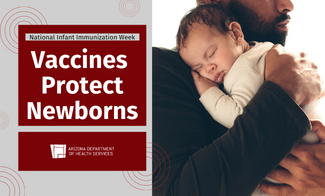During the disruptions of the past two years, it has been challenging for almost everyone to stay on schedule with vaccinations. This is especially true for new parents. The Centers for Disease Control and Prevention (CDC) recommends that newborns be protected from 14 serious childhood diseases by receiving vaccines according to a carefully designed schedule.
This is National Infant Immunization Week, which focuses on the positive impact vaccines have on the health of infants and children. It reminds parents and all of us of the importance of staying on schedule with life-saving vaccines.
Every year more than 80,000 children are born in Arizona. All of them need to be immunized against life-threatening childhood diseases. The Arizona Immunization Program and the CDC provide a wealth of information about immunizations.
Vaccination plays a critical role in protecting not only infants but everyone around them. The immunization schedule recommended by the CDC provides an easy-to-read guide for parents and pediatricians to follow. The schedule is based on how children’s immune systems work and the diseases that babies may be exposed to during their first two years of life.
Here are some of the benefits of vaccinating infants:
- Early protection: It is best to vaccinate before children are exposed to dangerous diseases. If parents wait until they think their child could be exposed to a serious illness (such as when they start daycare or during a disease outbreak), there may not be enough time for the vaccine to be effective.
- Best protection: Infants and children won’t have full protection unless they have all the recommended vaccinations. Every dose of each vaccine on the schedule is important.
- Long-term protection: Infants receive some protection from their mothers’ antibodies and from breastfeeding. However, this does not give lasting and full protection. Mothers’ antibodies wear off over time but vaccines stimulate long-lasting protection.. Even for breastfed infants, vaccines are needed to prevent many serious diseases.
- Reducing vulnerability: Delaying vaccines will prolong the time that infants and children are vulnerable to vaccine-preventable diseases.
- Not spreading illness: Children who are not fully vaccinated are at risk of getting sick and spreading infections to others who may not be protected, such as to newborns, infants, other children, the elderly, and those with weakened immune systems.
During National Infant Immunization Week, I encourage you to consider how vaccines benefit all of us. Just as childhood vaccines got you off to a healthy start in life, COVID-19 vaccines and boosters have provided safe and highly effective protection during this global pandemic. Please visit azhealth.gov/FindVaccine to find a location and make sure you are up to date on your COVID-19 vaccination.











